Survey reveals state of financial wellbeing – and who isn't coping
With many HR, benefits and rewards specialists reviewing their approach to financial wellbeing, we surveyed 1,300 UK workers to understand how they’re coping financially.
Some of the data points revealed in our The Workplace Today research were particularly surprising.
1. Those who earn the most are two times more likely than those who earn the least to manage personal finances while at work
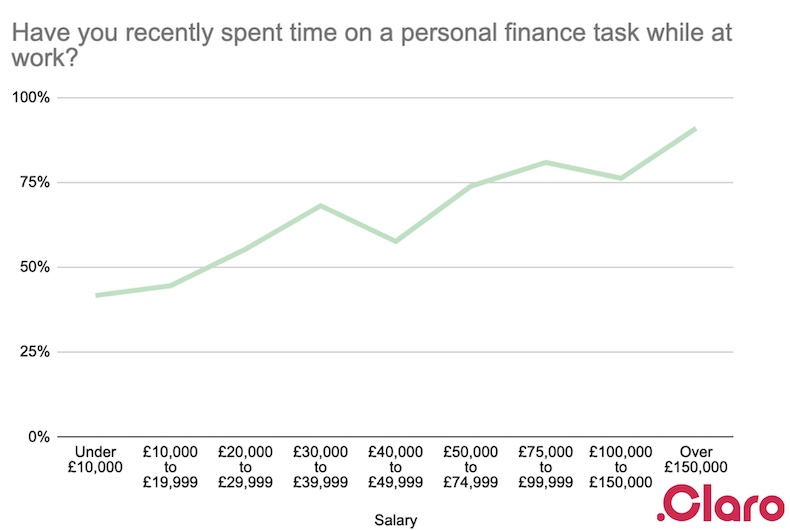
Our data shows that the more an employee earns, the more likely they are to spend time on a personal finance task, during office hours.
Those on less than £10,000 are least likely to manage their personal finances during work hours (42%), while those on more than £150,000 are the most likely to (90%). On average, 63% of employees say they have worked on personal finances while at work.
As part of a financial wellbeing strategy, organisations could introduce a specific time during the week for employees to work on personal finance tasks. Employees could, for instance, take part in Finance Friday sessions to tackle money-related tasks, or book a video session with an expert financial coach.
The potential outcome of a financial wellbeing strategy could be different for each employee, depending on what they earn. For example, having dedicated time to sort out their personal finances more effectively could see the highest paid spend more time on their work, with a large return on investment for the business by helping their highest-paid employees, whose time costs the most.
2. Generation Z and Millennials are more than two times more likely than Baby Boomers to have recently experienced poor mental health
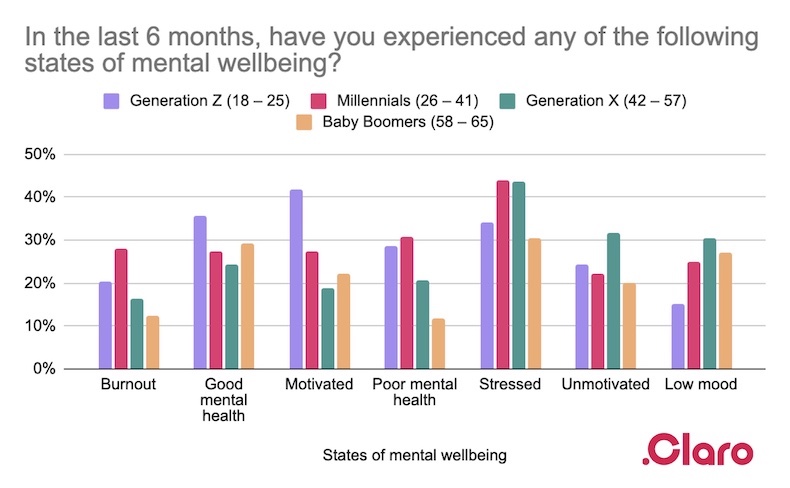
Almost one in three (29%) of Generation Z and 31% of Millennial employees say they have experienced poor mental health, compared with 21% of Generation X and 12% of Baby Boomer employees.
In the survey, this question let respondents choose multiple answers. And, on average, each respondent selected two of the above options.
Money and mental health are intrinsically linked. And when implementing a financial wellbeing strategy, leaders must factor in the dynamic nature of employee mental health.
Our past research has shown that the less financially confident an individual is, the worse their mental wellbeing tends to be.
3. Two in five Generation Z employees feel either not in control of their finances, unhappy, stressed or overwhelmed
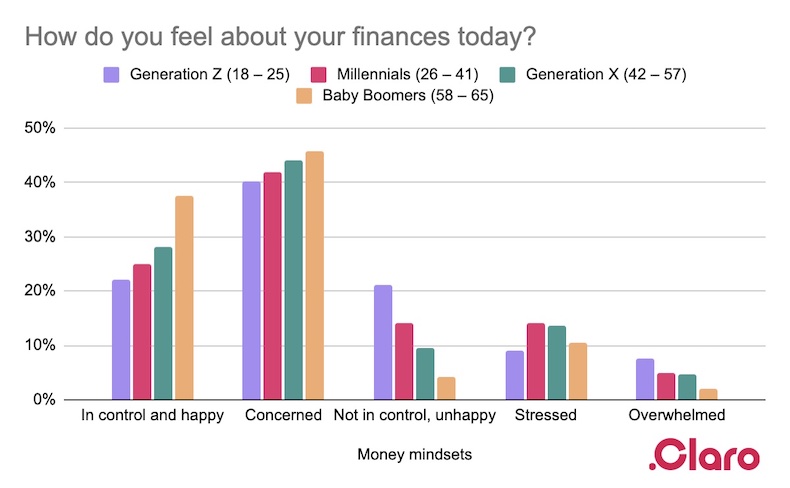
Young people are the most likely to feel like they are not in control or unhappy with their money, according to our data. Indeed, this is the case for 21% of Generation Z employees, while only 4% of Baby Boomers feel the same way.
Only one in five Generation Z employees is likely to feel in control and happy when it comes to money, compared with 25% of Millennial employees, 28% of Generation X and 38% of Baby Boomer employees.
Most employees, however, feel at least “concerned” about their finances as the cost of living continues to increase.
The goal of any financial wellbeing strategy is sure to make as many employees as possible feel in control of and happy about their money, no matter their age or stage of life.
But understanding that not all employees feel the same kinds of emotions about their money is an important step in planning the kind of support to offer company-wide.
4. Generation Z and Millennials are each twice as likely as Baby Boomers to say money worries affect their work
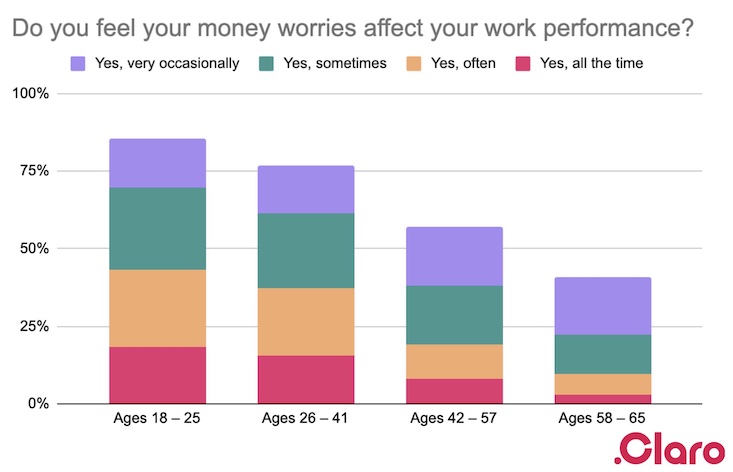
For every Baby Boomer that says money worries affect their work, there are two Generation Z and two Millennial employees that feel the same.
In total, 86% of Generation Z employees, 77% of Millennials, 57% of Generation X, and 41% of Baby Boomers say their work performance deteriorates as a result of money-related stress.
These figures reveal an unavoidable link between money worries and work performance. Indeed, as Professor Cary Cooper said in The Workplace Today: "How can anyone concentrate on work when they are anxious about money?"
Staggeringly, it’s not just the younger generations who bring their money worries to work, even though they are the most likely to.
When rolling out financial wellbeing, internal communications strategy should cater to all generations. For example, younger generations – while most likely to experience money worries – are also most likely to feel open to discussing them. Conversely, older generations might struggle.
5. The more money an employee earns, the more likely their money worries result in taking a sick day
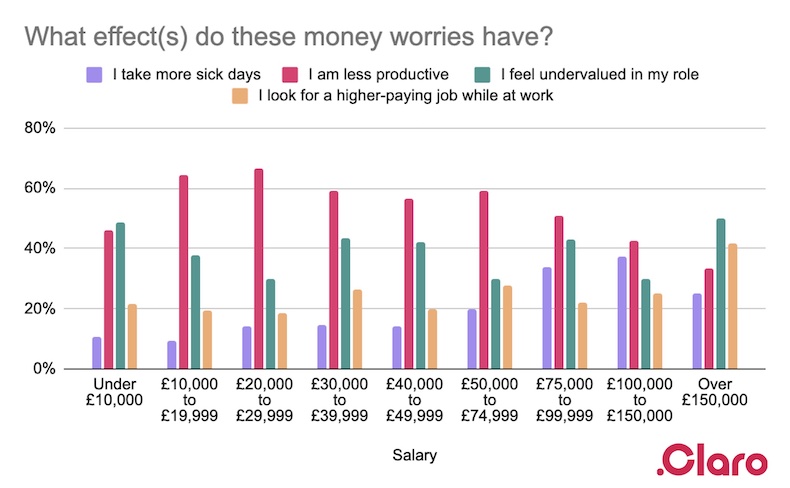
Unchecked, money worries can turn into employees taking sick days. Excluding the £150,000+ group, Caro’s data reveals a correlation between size of salary and likelihood of taking a sick day over money woes.
Most people on salaries between £10,000 and £150,000 find money worries make them less productive.
These issues are easily mitigated when a financial wellbeing strategy contains the right support.
Through preventative measures (like educational courses, webinars and budgeting platforms), an organisation can create conditions that make their employees less likely to suffer worsening financial health. And reactive measures (for example, financial coaching), can help its workers solve specific financial problems that result from worsening financial health.
6. The most common way an employee educates themselves on financial matters is to use Google
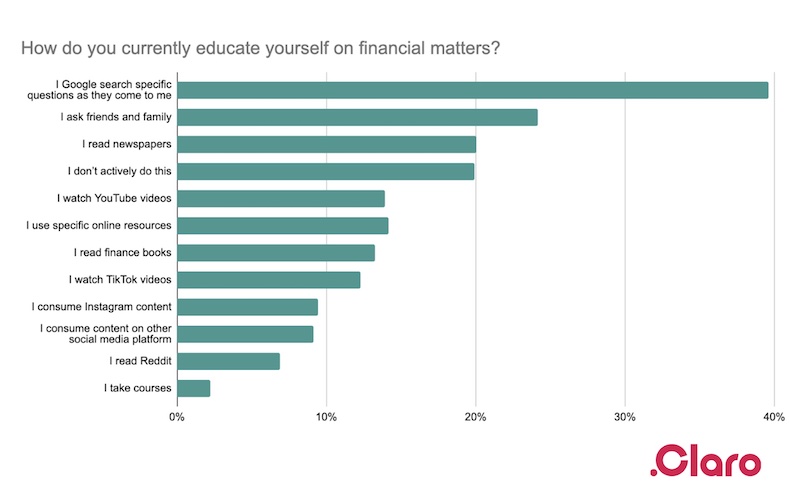
Google is the most likely source for an employee to learn about personal finances – a method preferred by 40% of employees. Almost a quarter (24%) ask their friends and family for advice, while one in five (20%) read newspapers and 14% watch YouTube videos.
More than one in 10 (12%) rely on TikTok, while a similar percentage (13%) read finance books.
7. Different employees value different kinds of support
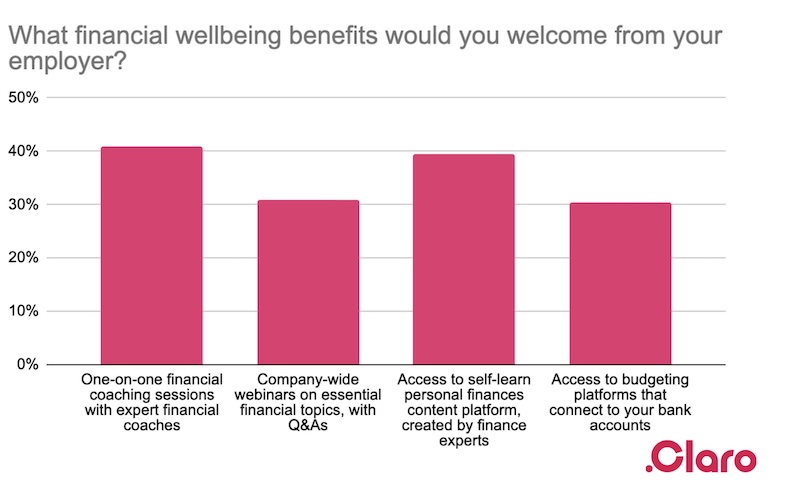
No one single type of financial wellbeing support stood out markedly against the others; survey respondents tended to pick more than one answer.
On average, 41% wanted one-to-one financial coaching while 40% opted for a self-learn personal finances platform. Almost one in three (31%) were interested in webinars on financial topics and 30% found a budgeting platform appealing
This supports the fact that an organisation’s financial wellbeing strategy should offer a mixture of different types of support.
If you don’t know what format of financial support would best suit your employees, you can ask them in a survey.
Supplied by REBA Associate Member, Claro Wellbeing
A financial wellbeing benefit to support your team where it matters most








